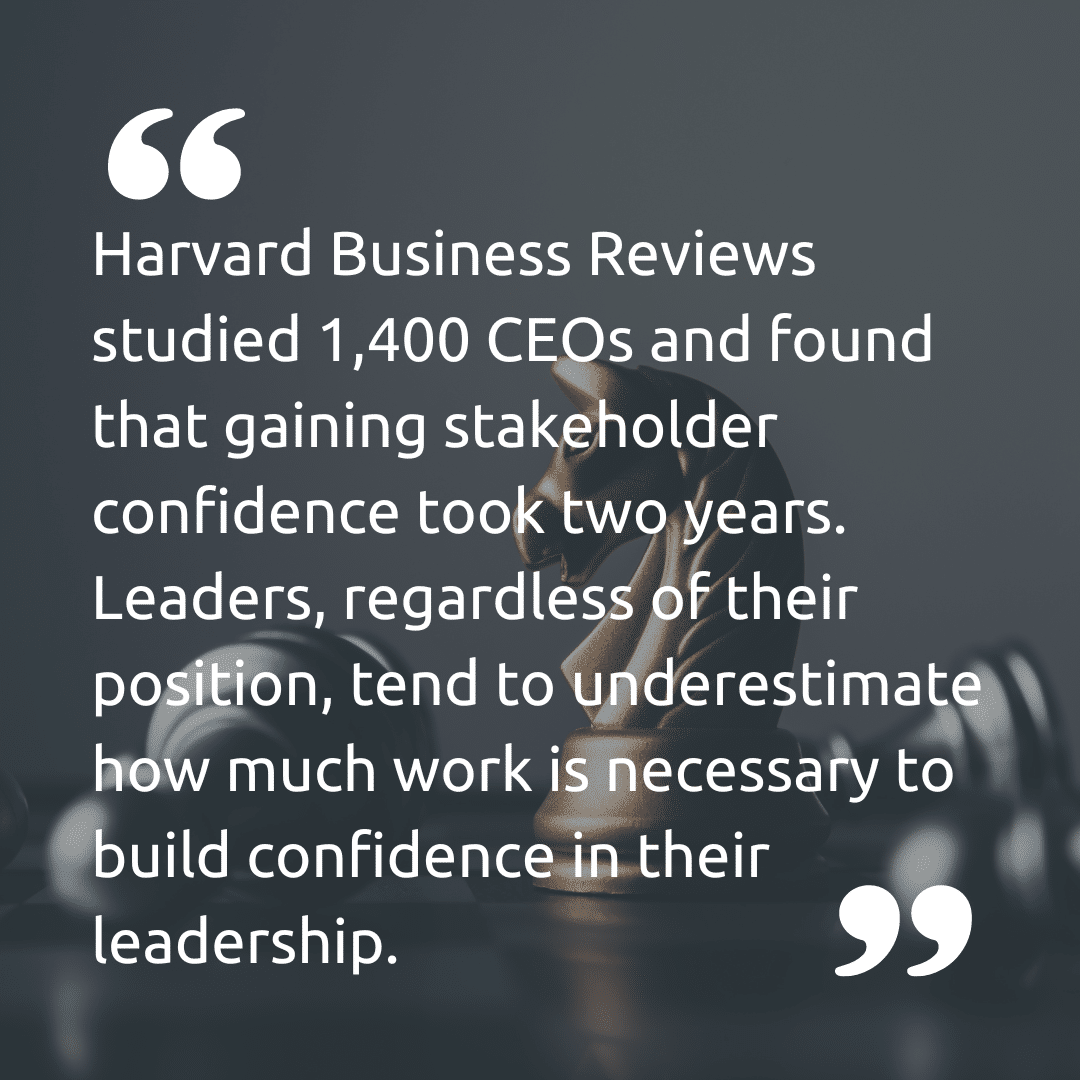There are growing concerns about talent shortages across many of Darwin’s recruiting sectors – Deep Tech, Renewable Energy, Life Science, Space and Defense, and Engineering (civil, structural, automation). This year, 2024, is set to be a threshold year with over 11,000 people per day reaching retirement age in the US[1] and the European Commission predicts the number of employed will drop from 4.196 million in 2023 to 4.09 million by 2030[2]. With these realities in mind, many businesses are upskilling their employees and building leaders from within.

The process of developing future leaders, however, is not always straightforward. Harvard Business Review[3] studied 1,400 CEOs and found that gaining stakeholder confidence took two years. Any business needs to balance the building of trust – absolutely vital for long-term success – with the need for quick wins. Leaders, regardless of their position, tend to underestimate how much work is necessary to build confidence in their leadership. Without this confidence, effective change is difficult and new initiatives can quickly fail.
If you’re a professional looking to take the next step in your career, now is the time to develop your soft skills and acquire strong leadership abilities. Consider these tips if you want to develop and use these skills to advance your career:
Understanding the Importance of Soft Skills
As a complement to your technical skills, soft skills are essential for improving communication, problem solving and teamwork. A person’s ability to adapt to change and grow in a fast-paced, diverse work environment depends on their emotional intelligence and interpersonal skills. Having technical expertise makes you desirable to a company, but demonstrating additional soft skills will make you an obvious candidate for promotion.
Communication is the key to successful teamwork. When presenting ideas and encouraging open dialogue in your team, active listening is equally as important as the ability to speak clearly and concisely.
Creating a positive work environment requires the ability to work well with others, but understanding and managing your emotions – and, by extension, recognizing and influencing the emotions of others – is a key leadership skill. Empathy, staying calm under pressure, and reflecting on your emotional responses are all part of emotional intelligence.
Develop Leadership Skills
Even if you do not formally hold a leadership position, showing leadership skills can set you apart and provide you with new career opportunities. It is far more cost-effective for businesses to identify and nurture leadership potential within their existing teams rather than recruiting externally.
Your desire to learn is a great indicator that you could gain the skills you need to play a larger role within your team. Using workshops, webinars, courses or self-study is a great way to increase your knowledge. Showing initiative in taking on extra responsibilities or volunteering for leadership roles in smaller projects can be a clear sign to your company that you are willing to step up and take the lead (however, ensure that you are also fairly compensated for your work – you can find out by using our salary benchmark tool).
If you want to improve your soft skills and leadership skills, practice makes perfect, but don’t forget to ask your peers, mentors, and supervisors for feedback. By gaining an outside perspective on your career journey, you can spot potential growth areas you might not have considered yourself or avoid potential pitfalls.
A mentor is a great way to gain this guidance and insight, as they can help you reflect on your experiences, assess your performance and adjust your approach with their encouragement. The importance of self-awareness cannot be overstated for personal and professional growth, and the insights of others are often the keys to better self-reflection.
Proving Your Leadership Potential
Happy employees are 20% more productive than unhappy ones[4], proving that good working relationships are the foundation of a high-performing team. Leaders who invest in building a strong, trusting and authentic connection within the team can best develop these bonds. Developing strong and healthy relationships with colleagues will set you on the path to becoming an effective leader. An in-depth look at how to improve your relationship skills at work is provided in this article[5].
As a leader, you must be able to change and adapt in a hyper-competitive environment, affected by geopolitical shifts and global crises. Change, whether internal or external, will challenge you. Make sure you don’t get left behind by being aware of what’s happening in your business, team or industry. Whether you are qualified to lead depends on your response to these changes.
To innovate successfully, you must first develop ideas, so don’t be afraid to push boundaries, focusing on creativity and needs of your customers. Maintain a competitive edge by fostering innovation and creativity in your team. There are numerous ways to achieve this, including encouraging teamwork wherever possible, utilising office design to inspire creativity, avoiding micromanagement, allowing freedom in working methods and encouraging knowledge sharing[6].
Finally, strong leadership skills include effective decision-making, conflict management, negotiation skills, and critical thinking. Taking decisive action requires conviction and the ability to balance making rational, sound decisions with adapting to changing circumstances as needed. Various personality traits influence decision-making styles, and this study[7] shows emotional intelligence has a significant positive impact on intuitive decision-making. Identify your personality type and learn how it impacts your decision-making style and work to enhance your natural strengths and minimize your weaknesses[8].
You should maintain realistic expectations about what leadership entails, and a large portion of your time as a leader is spent managing conflict and promoting peaceful work environments. Much of your time will be spent identifying and resolving issues before they negatively affect the organization. Develop foresight and rational thinking so you can turn potential disruptions into opportunities for stronger bonds and new ideas.
You will focus on effective negotiation after potential crises have been resolved; helping to build better relationships and finding the best long-term solutions. To get you started on negotiating in the workplace, this article[9] explains the dos and don’ts.
Last but not least, if you lack critical thinking skills, you will not be able to deal with complex problems at work. A critical thinker asks the right questions to reach the best conclusion and boosts their decision-making ability with available data to solve those problems. The ability to analyse situations and make informed decisions is essential for ensuring the long-term success of your team and business. Critical thinking skills can be improved in many ways[10], but it requires a willingness to tackle ambiguity and challenge your own assumptions.
As so many businesses are actively seeking to nurture their own talent, now is a great time to grow and develop your leadership skills. Make use of these changes to improve your leadership skills and become a trusted and effective leader. We hope these tips have proven helpful to get you started on the journey.
[1] https://www.manpowergroupusa.com/insights/baby-boomers
[2] https://www.ekathimerini.com/economy/1236971/baby-boomers-are-retiring/
[3] https://hbr.org/2024/07/how-ceos-build-confidence-in-their-leadership
[4] https://www.wellsteps.com/blog/2022/05/17/happy-employees-more-productive/
[5] https://uk.indeed.com/career-advice/career-development/relationship-building-in-the-workplace
[6] https://uk.indeed.com/hire/c/info/creativity-innovation?gad_source=1&gclid=CjwKCAjw2Je1BhAgEiwAp3KY70rVSZyZhac5ZHDOt79xfiXryX79hDCrBTBdO9uHMp70iGXi_CLPwRoCF7oQAvD_BwE&aceid=&gclsrc=aw.ds
[7] https://bmcpsychology.biomedcentral.com/articles/10.1186/s40359-020-00406-4
[8] https://www.linkedin.com/pulse/how-your-personality-influences-decision-making-garin/
[9] https://hbr.org/2022/10/work-speak-the-right-way-to-negotiate





